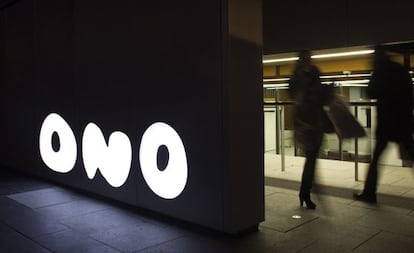ONO to proceed to list after shrugging aside Vodafone approach
Spanish cable operator believes stock market flotation would unlock higher value

The board of directors of Spanish cable operator ONO has decided to continue with its plans for an initial public share offering, leaving to one side a reported offer for the company of 7 billion euros from British cellphone giant Vodafone and other possible offers such as one from US firm Liberty.
The British private equity firms that control 55 percent of ONO believe that Vodafone’s informal offer falls short of the mark and that an IPO would unlock the true value of the company. German cable operator Kabel Deutschland floated on the stock market before being bought by Vodafone last year.
The board at Tuesday’s meeting discussed different possibilities for the future of the company but did not evaluate any concrete offers for it, contrary to what the British media had reported. Vodafone expressed interest in the cable operator but did not present a formal offer, sources with knowledge of the operation said.
“The board of directors did not present or discuss any offers to acquire ONO on the part of any company, nor any other matter related to the issue,” ONO said in a statement issued Wednesday.
Vodafone has both the firepower and likely synergies to justify paying a full price, which could be north of 8 billion euros,” analyst says
The board plans to float ONO in the spring. In order to do so it has called a general shareholders’ meeting for March 13 on the operation, which will consist of an initial capital increase of 800 million euros and a subsequent public sale of between 200 and 300 million euros’ worth of shares. The main aim is to set a reference price for the company and to subsequently let potential buyers bid for it. Funds obtained from the share sale will be used to reduce debt, which currently stands at 3.3 billion euros. ONO has appointed Deutsche Bank and JP Morgan to carry out the share placement.
“I would not exclude Vodafone engaging in last-minute negotiations with ONO’s shareholders,” Bloomberg quoted Henri Alexaline, a fixed-income investor who helps manage $1 billion at FM Capital in London, as saying. “It’s all down to valuation at this point and Vodafone has both the firepower and likely synergies to justify paying a full price, which could be north of 8 billion euros.”
Although ONO’s board has opted to list on the stock market, the ultimate aim is to sell the company in the short term either through a direct sale or a friendly takeover offer.
ONO’s 13-member board is dominated by the investment funds CCMP, Providence, Thomas H. Lee and Quadrangle, with each having five members who vote en bloc, while General Electric and Canadian investment fund Caisse de Dépôt et Placement du Québec each have a representative. The Spanish funds Multitel and Val, which are linked to ONO’s founder, Eugenio Galdón, have two seats, while the remaining seats are held by the chairman, José María Castellano, the chief executive officer, Rosa Portela, and by two independent directors.
Vodafone’s chief interest in ONO is to strengthen its presence in Spain. The possible acquisition of ONO would boost its number of broadband clients from 953,000 to 2.65 million, a market share of 21 percent. It would also add one million mobile clients to the 13.6 million it already has for a market share of 26 percent. The British company has lost 1.7 million cellphone clients over the past 12 months, mainly to ONO and Jazztel. Vodafone has also signed an agreement with France Telecom’s cellphone brand Orange to roll out a fiber-optic network that would cover six million households in 50 Spanish cities within four years.
Tu suscripción se está usando en otro dispositivo
¿Quieres añadir otro usuario a tu suscripción?
Si continúas leyendo en este dispositivo, no se podrá leer en el otro.
FlechaTu suscripción se está usando en otro dispositivo y solo puedes acceder a EL PAÍS desde un dispositivo a la vez.
Si quieres compartir tu cuenta, cambia tu suscripción a la modalidad Premium, así podrás añadir otro usuario. Cada uno accederá con su propia cuenta de email, lo que os permitirá personalizar vuestra experiencia en EL PAÍS.
¿Tienes una suscripción de empresa? Accede aquí para contratar más cuentas.
En el caso de no saber quién está usando tu cuenta, te recomendamos cambiar tu contraseña aquí.
Si decides continuar compartiendo tu cuenta, este mensaje se mostrará en tu dispositivo y en el de la otra persona que está usando tu cuenta de forma indefinida, afectando a tu experiencia de lectura. Puedes consultar aquí los términos y condiciones de la suscripción digital.








































